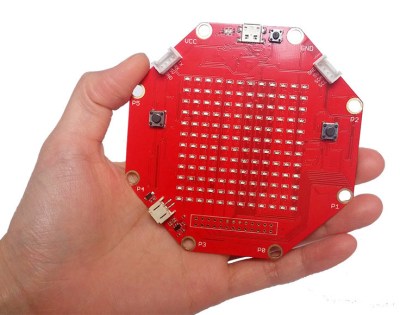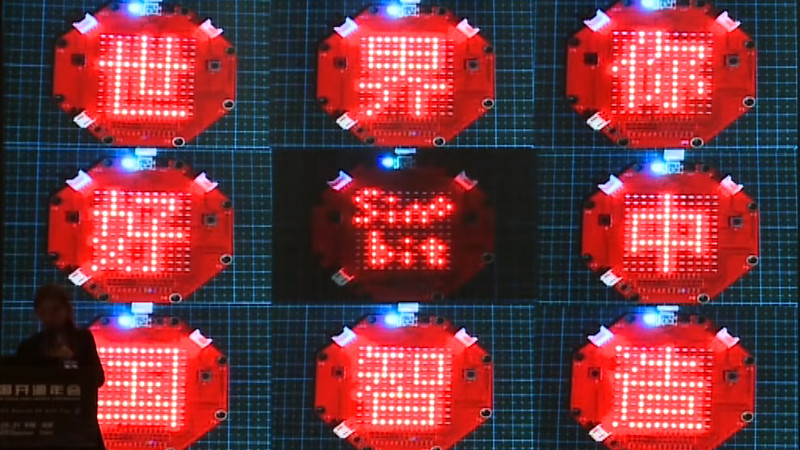Many readers will be familiar with [Naomi Wu], the prolific hardware hacker who has shown us so much of the epicentre of Chinese tech in her native Shenzhen through a lens that most outsiders would struggle to achieve. We’ve seen her touring factories and electronics marts, building a load of interesting projects, and achieving the first open source hardware certifications in China.
We’ve seen a lot of [Naomi] speaking to us in English as an audience outside her country, so it is extremely interesting to see her latest video posting in which she makes her case for open source hardware in Chinese to a Chinese audience (Chinese audio with English subtitles). She’s speaking at the recent China open source conference, and her description starts with “**THIS IS VERY BORING UNLESS YOU ARE INTO OPEN SOURCE**”, which we think is a little unfair as it should appeal to anyone with an interest in the Chinese tech business.
 In the talk she takes us through the potential benefits of open source to Chinese business by using her projects as case studies. In particular she concentrates on how the arguments for open source in a commercial arena have to be made differently for a Chinese business to those used in the rest of the world. Using the analogy of a college dorm hotpot party, she outlines the importance of a community in open-source development, then we get a blow-by blow account of her work with Elecrow and Creality on the Sino:bit (a single-board computer targeting education in China) and the 3D printers.
In the talk she takes us through the potential benefits of open source to Chinese business by using her projects as case studies. In particular she concentrates on how the arguments for open source in a commercial arena have to be made differently for a Chinese business to those used in the rest of the world. Using the analogy of a college dorm hotpot party, she outlines the importance of a community in open-source development, then we get a blow-by blow account of her work with Elecrow and Creality on the Sino:bit (a single-board computer targeting education in China) and the 3D printers.
The software support for the Sino:bit in particular demonstrates the added value of open source to a business, with significant tutorial and curriculum material coming from Adafruit Industries, Hindi language and character set support from developers in India, and a Chinese developer painstakingly transcribing all the Chinese character set for the device. That last step alone would have cost a non open-source developer a significant sum.
During her talk we are shown the commercial benefits to all three devices, for example one of the Creality 3D printers rapidly becoming Amazon’s top seller despite an array of knock-off machines appearing. We’ve embedded the video below the break, and we think it should be required viewing for anyone with an interest in open source or the Chinese tech industry.
Once you have seen the video you might find [Naomi’s] guide to buying on Taobao to be of interest, as well as her explanation of the Chinese cultural attitude to engineers while introducing us to the historical master craftsman, [Lu Ban].

















“a Chinese developer painstakingly transcribing all the Chinese character set (…) would have cost a non open-source developer a significant sum”
Well, Chinese invented the wheel, no ?
So why not REUSING it ? that wheel is a .bdf font file for Chinese, there are open-source Chinese fonts with low-res. Just directly convert the .bdf into a C file with a tool like this one: https://github.com/pixelmatix/bdf2c
No need to have somebody sweating for it !!!
Sorry, was unclear- just those eight tiles were hand drawn. Not the whole font set???? The whole font set took a little while because fitting it in the limited memory was tricky.
My apologies, I misunderstood the subtitles.
https://github.com/LingDong-/rrpl
Would a font chip have sped up development? Not sure if they have 4000 characters though.
https://www.buydisplay.com/default/font-chip-ic-er3303-1-contains-gb2312-gb12345-big-5-chinese-ascii
I love her channel on youtube.
I think this video shows her wearing the most clothes ever in her history. ;)
Not trying to knock this project but this is old news and if you look at the github page you find that neither the sino:bit or calliope have been updated in about a year. While I realize that this project is opensource, wouldn’t it have been better to work with something like the orange pi 2g-iot with a screen that can be bought for under $20us and push for better learning tools for it so that it became a RPI competitor with a Chinese education focus? It seems to me that getting a bunch of Chinese companies to see the benefits of opensource might be easier with software that can be shared and updated by the userbase if enough momentum is given to it at the start.
@Naomi Wu, what are your thoughts on open source vs free\libre software? Does ‘free’ software have any place in Chinese Culture? Here is some background:
https://www.gnu.org/philosophy/open-source-misses-the-point.html
I remember eating at a restaurant in shekou with your husband, and he was telling me about Deng Xiaoping. I think the line you have at the end of this video, reminds me of Deng and his phrases. Well Done, keep up the good work!